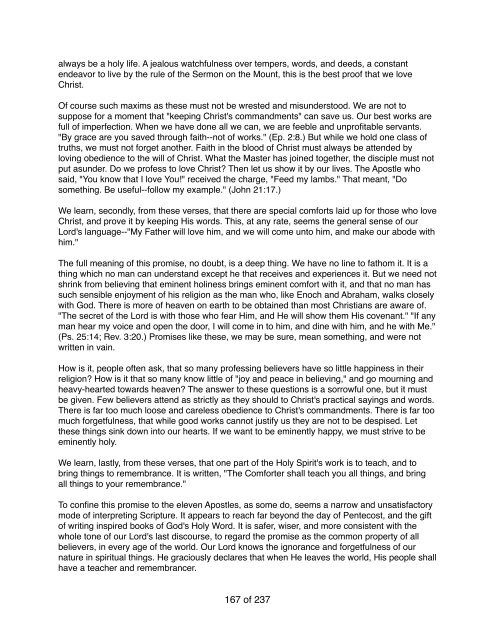J. C. Ryle John
John Charles Ryle (May 10, 1816 - June 10, 1900) was an evangelical Anglican clergyman and first Bishop of Liverpool. He was renowned for his powerful preaching and extensive tracts.
John Charles Ryle (May 10, 1816 - June 10, 1900) was an evangelical Anglican clergyman and first Bishop of Liverpool. He was renowned for his powerful preaching and extensive tracts.
Create successful ePaper yourself
Turn your PDF publications into a flip-book with our unique Google optimized e-Paper software.
always be a holy life. A jealous watchfulness over tempers, words, and deeds, a constant<br />
endeavor to live by the rule of the Sermon on the Mount, this is the best proof that we love<br />
Christ.<br />
Of course such maxims as these must not be wrested and misunderstood. We are not to<br />
suppose for a moment that "keeping Christ's commandments" can save us. Our best works are<br />
full of imperfection. When we have done all we can, we are feeble and unprofitable servants.<br />
"By grace are you saved through faith--not of works." (Ep. 2:8.) But while we hold one class of<br />
truths, we must not forget another. Faith in the blood of Christ must always be attended by<br />
loving obedience to the will of Christ. What the Master has joined together, the disciple must not<br />
put asunder. Do we profess to love Christ? Then let us show it by our lives. The Apostle who<br />
said, "You know that I love You!" received the charge, "Feed my lambs." That meant, "Do<br />
something. Be useful--follow my example." (<strong>John</strong> 21:17.)<br />
We learn, secondly, from these verses, that there are special comforts laid up for those who love<br />
Christ, and prove it by keeping His words. This, at any rate, seems the general sense of our<br />
Lord's language--"My Father will love him, and we will come unto him, and make our abode with<br />
him."<br />
The full meaning of this promise, no doubt, is a deep thing. We have no line to fathom it. It is a<br />
thing which no man can understand except he that receives and experiences it. But we need not<br />
shrink from believing that eminent holiness brings eminent comfort with it, and that no man has<br />
such sensible enjoyment of his religion as the man who, like Enoch and Abraham, walks closely<br />
with God. There is more of heaven on earth to be obtained than most Christians are aware of.<br />
"The secret of the Lord is with those who fear Him, and He will show them His covenant." "If any<br />
man hear my voice and open the door, I will come in to him, and dine with him, and he with Me."<br />
(Ps. 25:14; Rev. 3:20.) Promises like these, we may be sure, mean something, and were not<br />
written in vain.<br />
How is it, people often ask, that so many professing believers have so little happiness in their<br />
religion? How is it that so many know little of "joy and peace in believing," and go mourning and<br />
heavy-hearted towards heaven? The answer to these questions is a sorrowful one, but it must<br />
be given. Few believers attend as strictly as they should to Christ's practical sayings and words.<br />
There is far too much loose and careless obedience to Christ's commandments. There is far too<br />
much forgetfulness, that while good works cannot justify us they are not to be despised. Let<br />
these things sink down into our hearts. If we want to be eminently happy, we must strive to be<br />
eminently holy.<br />
We learn, lastly, from these verses, that one part of the Holy Spirit's work is to teach, and to<br />
bring things to remembrance. It is written, "The Comforter shall teach you all things, and bring<br />
all things to your remembrance."<br />
To confine this promise to the eleven Apostles, as some do, seems a narrow and unsatisfactory<br />
mode of interpreting Scripture. It appears to reach far beyond the day of Pentecost, and the gift<br />
of writing inspired books of God's Holy Word. It is safer, wiser, and more consistent with the<br />
whole tone of our Lord's last discourse, to regard the promise as the common property of all<br />
believers, in every age of the world. Our Lord knows the ignorance and forgetfulness of our<br />
nature in spiritual things. He graciously declares that when He leaves the world, His people shall<br />
have a teacher and remembrancer.<br />
167 of 237




